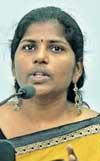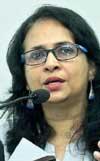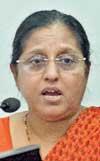Reply To:
Name - Reply Comment

 2019 marks the first decade after the end of the war. Along the road to peace-building and reconciliation that we have tread since 2009, it is crucial that we recognize and acknowledge issues related to the conflict and address them promptly. A grim reality of Sri Lanka’s armed conflict was that girls and women were subjected to different acts of sexual violence by members of the army, government officials, and relatives and even married partners during and after the conflict. Apart from the trauma and violation of human rights undergone by those who were subjected to sexual violence, the stigma with which they are seen by their families, communities and even by themselves, makes recovery from such situations all the more difficult.
2019 marks the first decade after the end of the war. Along the road to peace-building and reconciliation that we have tread since 2009, it is crucial that we recognize and acknowledge issues related to the conflict and address them promptly. A grim reality of Sri Lanka’s armed conflict was that girls and women were subjected to different acts of sexual violence by members of the army, government officials, and relatives and even married partners during and after the conflict. Apart from the trauma and violation of human rights undergone by those who were subjected to sexual violence, the stigma with which they are seen by their families, communities and even by themselves, makes recovery from such situations all the more difficult.
According to the Principles of Global Action on Preventing and Addressing Stigma Associated with Sexual Violence in Conflict, stigma is the penalising or blame on individuals, groups and communities for bringing shame or ‘transgressing’ from social standards. In furtherance of these principles, the Centre for Equality and Justice (CEJ) has endeavoured to study stigma associated with victim-survivors of conflict related sexual violence in Sri Lanka, seeking to identify the root-causes of stigma, its negative effects, and most importantly about how to tackle it.
How the study was conducted

It was challenging to understand the life experiences and frustration of the victim-survivors
The study has been conducted in a few conflict-affected areas of the country, gathering data from 53 participants including the victim-survivors themselves, their representatives and also service providers. The CEJ has premised the study on a broad definition to CRSV involving different forms of violence against women.
Kamaleswary Letchumanan - Senior programme officer, speaking of the challenges faced when conducting the study, stated that it was challenging to understand the life experiences and frustration of the victim-survivors, and difficult to understand the concept of stigma itself. The team also had to take measures to ensure that the victim-survivors are not re-traumatized.
Findings of the Study

Speaking about stigma and advocating against it can lead to victim-survivors being further reproached by their communities
Ms. Shyamala Gomez - Executive Director - CEJ explained that it is very common for those who have been subjected to conflict related sexual violence to also be stigmatized. The study has identified a cycle of violence where victim-survivors are subjected to further violence at the hands of service providers when seeking relief. There have been ample instances where police officers and other members of government and other services have requested for sexual advances in order to render services to them. Those who view themselves as of no consequence any more for having undergone the experiences that they have, because of the stigma attached to the issue, have sometimes undertaken sex work and given up hopes of leading a dignified life.
As pointed out by Ms. Gomez, the most critical aspect of stigma in relation to sexual violence during conflicts is how it prevents victim-survivors from accessing the criminal justice system and obtaining legal relief. She stated that it is only one person who has gone through the court process and obtained some sort of relief through the legal mechanisms in place. The distrust in public institutions and the fear of being subjected to further violence have held back some from even making a complaint at the police station.
A statement made by a victim-survivor - “I never looked for a remedy due to fear. There is no possibility of receiving justice for what happened. The army has a lot of power and influence. No one challenges them. Therefore I live in constant fear.”
Similar to the criminal justice system, victim-survivors have also not accessed any counselling or psycho-social services because they don’t want to be accused of having contributed to the experience that they have suffered. Ms. Gomez stated that some have not even thought of accessing such services.
The study has also identified that those who have suffered from sexual violence during the conflict view themselves as ‘invalid coins’ and doomed to be spending their lives in misery and that they are of no value.
A statement made by a victim-survivor- “I sometimes wonder whether this is my fate. People are difficult to understand. When someone falls into trouble they trample them down further. Not only will they do not help, they will not even look at my face”
Ms. Gomez further stated that speaking about stigma and advocating against it can lead to victim-survivors being further reproached by their communities
“We must not only think about advocating against the perpetration of violence itself, but must address the underlying issue of stigma, which will nevertheless remain with the victim-survivors throughout their lives. Stigma runs like a thread in other problems that they face like the loss of family members, missing persons, loss of property.”
Community-based organizations have been extremely supportive in assisting the victim-survivors in the process of recovering from their traumatic experiences, in accessing police stations and healthcare services.
Speaking of the lasting harmful impacts of stigma associated with CRSV, Ms. Gomez also spoke about how, in addition to the victim-survivors, their family structures breaks down almost completely. Victim-survivor of alleged rape - “I was married. I had two children. They became frustrated after this incident. My husband started insulting and scolding me. As I couldn’t bear that trauma anymore, I separated from him.”
Protecting rights and dignity of victim-survivors

A well thought-out approach must be adopted in order to tackle stigma related to CRSV
Ms. Maithreyi Rajasingham, Executive Director - Viluthu-Centre for Human Resource Development stated how an extremely cautious and well thought-out approach must be adopted in order to tackle stigma related to CRSV. She stressed the importance of understanding what stigma really is, because our thought process may be already accustomed to think in a certain way, based on the stigma with which CRSV victim-survivors are viewed.
Ms. Rajasingham underscored the importance of respecting and promoting the rights and dignity of the victim-survivors when taking these measures. She also highlighted on the need to include in all the measures taken, as those who are affected by CRSV is not a homogeneous group.
Role of the Office on Missing Persons

OMP will strive hard to develop policy and mechanisms to deal with the issue of stigma associated with CRSV
Dr. Nimalka Fernando, Commissioner of the Office on Missing Persons (OMP) clarified that role of the OMP as a State-sponsored mechanism, is to address the issue of the disappeared and missing within the larger context of war, including the issue of sexual violence and stigma. She stated that with State institutions like the OMP coming up, those who are affected are assured that the government has more empathy towards them, showing how people need a response from the State despite the work done by non-governmental organizations. Harping on the importance of having discourses on these topics with State institutions like the OMP, Dr. Fernando assured that the OMP will strive hard to develop policy and mechanisms to deal with the issue of stigma associated with CRSV.
Dr. Fernando insisted that we need to address stigma that is attached to ethnicity, gender and many other aspects of our lives, and the use of such stigma as a political tool. In that sense, she stated that our efforts must be doubled because we need to, as a democratic society, respond to this issue and take responsibility for non-recurrence.
“Addressing stigma is not going to be easy because it involves addressing practices and values which have religious connotations and patriarchal system itself. But it is important that we keep pressuring State institutions to take up these issues and lobbying for justice and accountability”
Recommendations
In terms of recommendations, Ms. Gomez stated that existing national action plans like the National Action Plan to address Sexual and Gender-Based Violence (SGBV) launched by the Ministry of Women and Child Affairs and spearheaded by the United Nations Development Programme must be used to address the issue of stigma associated with conflict related sexual violence.
She also pointed out that measures must be taken by the Office of Reparations to approach those who have been affected because it is unlikely that they will approach the office because of fear of being subjected to stigma.
In addition to these recommendations, the study has also recommended training public officers to deal with victim-survivors of CRSV and the stigma they experience, facilitating professional and empathetic counselling services for victim-survivors, training media to prevent the stigma from being perpetuated due to unethical reporting and memorializing the pain and trauma of the victim-survivors, which is a recommendation that had been put forward by victim-survivors themselves.
Ms. Rajasingham also spoke about the importance of memorializing the experiences of the victim-survivors of CRSV in order to addressing the issue of stigma associated with it. She suggested arranging public spaces to engage in dialogue to discuss and understand the stigma and the manner in which it is done. She opined that the acknowledgement of the occurrence of sexual violence and the issues revolving it would contribute to tackle stigma
The importance of engaging religious leaders was also stressed in order to raise awareness about how certain religious practices may promote stigma and how that must be tackled
Global Agenda to address Stigma

Consequences for the victims of violence in conflict are even more acute because of the stigma, shame and humiliation experienced by them and their families
The UN, its agencies and the UK have taken the leadership in developing an international framework to address the issue of stigma associated with conflict related sexual violence. British High Commissioner for Sri LankaJames Dauris states that Global Summit to End Sexual Violence in Conflict co-chaired by the UK’s Foreign Secretary and Angelina Jolie, Special Envoy for the UN High Commissioner for Refugees took place in 2014. It was the largest gathering ever brought together on the subject, with 1,700 delegates and 123 country delegations. Mr. Dauris assured that there is greater awareness and global action implemented pursuant to the summit, but that globally, survivors of sexual violence still continue to be ostracized.
Mr. Dauris claimed that the consequences for the victims of violence in conflict are even more acute because of the stigma, shame and humiliation experienced by them and their families. Years later, they continue to face significant barriers to accessing services like health care, psycho-social support and justice mechanisms.
“Although tackling issues of stigma is difficult, particularly where strong taboos exist about talking about it, that it is not a good reason not to try. It takes committed politicians, government officials, law enforcement officials, and religious and community leaders to overcome these attitudes.”